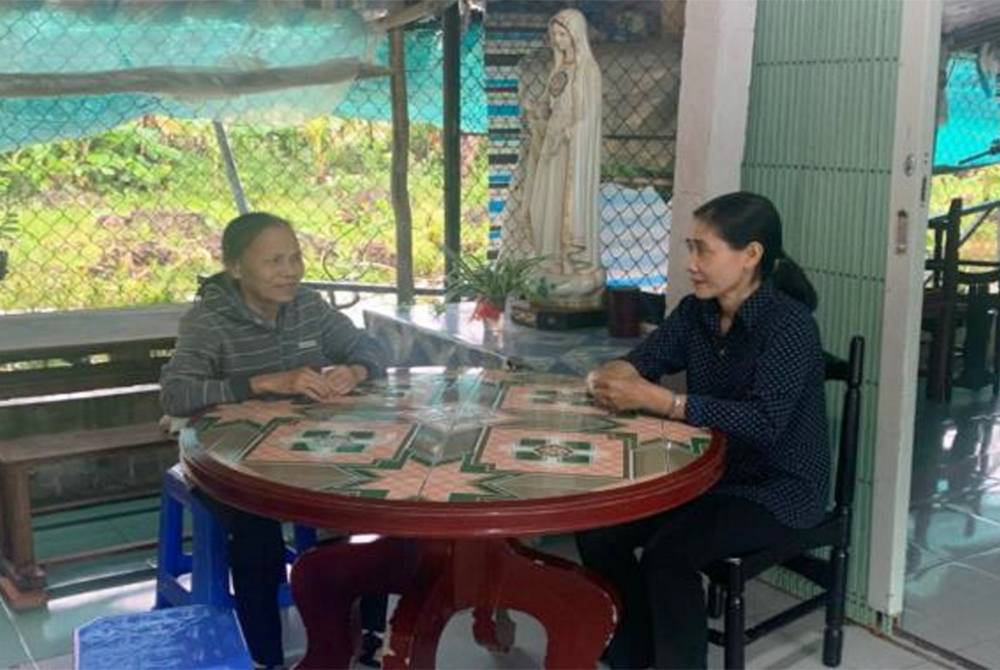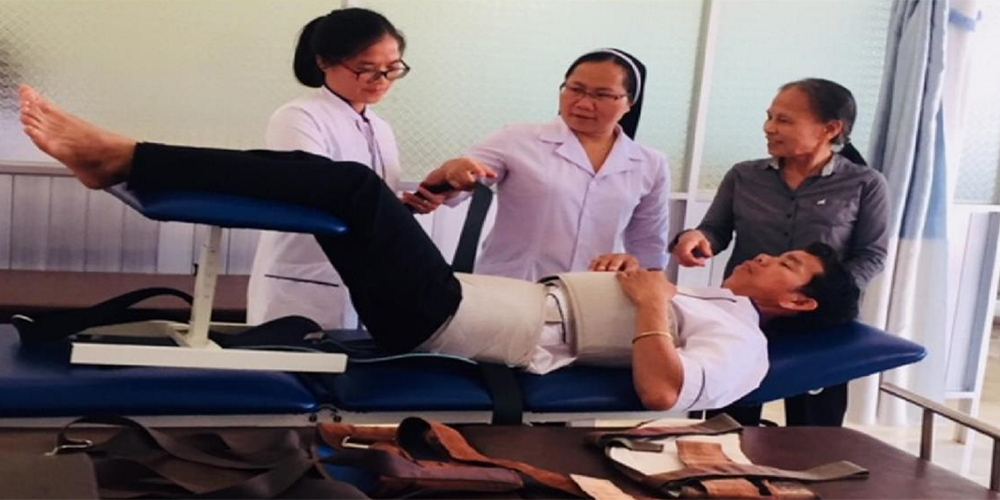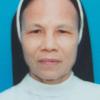
Sr. Mary Nguyen Thi My, left, meets with Sister Chuong of the Daughters of the Mother of God, about a report for a project on water purification. Since 2000, Sr. Mary Nguyen Thi My has worked with Vietnamese sisters, using her knowledge of English to help them apply for grants to fund various ministries. (Courtesy of Mary Nguyen Thi My)
I have been working with Vietnamese sisters' congregations since 2000 as a consultant, to help them apply for grants (particularly to the Conrad N. Hilton Fund for Sisters) to fund their various ministries. Many do not know English, and that is the skill I brought to this work. (The Conrad N. Hilton Fund for Sisters is a separate organization from the Conrad N. Hilton Foundation, which funds Global Sisters Report.)
I traveled to congregations working in the Mekong Delta and in four provinces; in 2015, I accompanied Sr. Joyce Meyer to some communities in Vietnam and Cambodia to hear their stories for Global Sisters Report. When Joachim Pham, a reporter for Global Sisters Report, was beginning his work, I accompanied him to get to know sisters in various parts of Vietnam.
Sisters in Vietnam are very creative. Under communism, they are not allowed to run formal schools, except for kindergartens, but they — like the Good Shepherd — seek out those forgotten by society, the suffering and the lost. It has been a great joy for me to do this work and to witness their creativity.
Beginning in January 2019 I traveled by bus, motor bike and boats to assist congregations. My first visit was to the Daughters of the Mother of God. Sister Chuong and I traveled by boat to her community where I planned to help her with the report for a project for water purification. I had helped her write the application for funds and the need was certainly visible.
On that first visit I saw people collecting drinking water from a polluted canal filled with insecticide bottles, fertilizer containers and other refuse, and it smelled terrible. The two sisters discovered this and other needs as they worked in evangelization among the families, visited the sick and taught the children to read and write Vietnamese. I was very impressed to learn that the local bishop provided the sisters with funds each year for their living costs, something uncommon in Vietnam.
The following month, Sister Chau — a friend — and I visited the Sacred Heart parish of Khiet Tam, located in Canal D on the Mekong River. Three Daughters of Our Lady of the Holy Rosary in the parish teach liturgical music and provide classes in Vietnamese and catechism, visit the sick, and other needs of the families. Here too, the people were using water from a canal polluted with insecticides for insects and worms. They desperately needed a water purification system to protect their health. There are many villages, schools and hostels throughout Vietnam that do not have clean water.
My work took me to clinics where sisters provide both western and traditional Vietnamese health care, like The Sisters of Providence of Can Tho province who have a four-room clinic. Since 1998, they have provided routine health services and treated sick children for malnutrition, fevers and other childhood issues. They use acupuncture physical therapies for pain. Each day about 50 patients visit the clinic. These sisters needed a new laser acupuncture machine, along with foot massage chairs and tables, which they were able to obtain eventually.
Then I visited the clinic of the Dominican Sisters of St. Rose of Lima in My Linh, Gia Lai province. Two sister doctors — having seen many people dying needlessly — work here to treat very poor ethnic minority families. Sister Ha, a western medical doctor, treats them with western medicines and an electrical therapy bed for severe back pain. Sister Tu is a traditional physician who treats common illnesses with physical therapies and acupuncture. Since 2007 they have treated about 70 patients a day.

Sr. Mary Nguyen Thi My visits with Sister Ha, who is treating a man with back pain on an electrical therapy bed, at the clinic of the Dominican Sisters of St. Rose of Lima in My Linh, Gia Lai province. (Courtesy of Mary Nguyen Thi My)
Searching out the forgotten in remote areas of Vietnam is a specialty of sisters. Even though at times, the government is suspicious of them and finds ways to harass them, the sisters do not give up. They usually begin their work in small ways that do not draw much attention. When I visited the Lovers of the Holy Cross of Can Tho, they were living in a small thatched cottage, like the village families. Gradually, they began gathering illiterate children to teach them Vietnamese reading and writing and would visit families telling them about Jesus. About 2000, a couple of years after they arrived, the government policy changed so that the sisters could hold regular classes for the children in literacy, organ and cooking. Their classroom needed repair, so I helped them get a grant.
There are many groups of ethnic minority families in Vietnam, often living in remote mountainous regions. This is "sister" territory. One such community is the Sisters of Providence, founded in 2005. The sisters working in the Binh Phoc province found many of the same problems of illiteracy, illness, poverty and lack of clean water. This group also works with ethnic minority families who are low-wage day laborers. The sisters began by caring for the children left behind by parents who went off to work ,and gradually established formal classes for literacy and music. They eventually were able to find funds for a clean water system that helped alleviate serious health issues.
Providing hostels for ethnic tribal children is another important service of sisters in Vietnam. The Sisters of Providence of Tay Nguyen founded one in 1999. The children's families are scattered in surrounding forests and without the sisters' help, their children would not be educated. The girls go to public primary, high school and colleges and are kept safe and well fed by the sisters. The 120 girls are a large number to feed, so local benefactors supply them with rice, noodles and sugar, and even help with tuition.
What was most needed were toilets for the girls as the old ones were collapsing. When I visited I found that the girls were using the toilets of the primary students; in the rainy season the older girls brought the mud from the pathway into the toilet area. It was a joy to see new toilets when I visited later to help with the grant report!
Advertisement
Young women are a special focus of many of the sisters, like four Dominican Sisters of St Rose of Lima in a remote area. They opened a hostel for ethnic girls from grade 3 to high school, in the communities of Ham Lihn and Chu Se in Pleiku City. Those with less capacity are tutored at the hostel. While doing this work, the sisters discovered many young pregnant women. Four sisters have been working with 23 of these women since 2007. Pregnancy outside of marriage brings shame to the women and families that can lead to families demanding abortions. The sisters rescue some of these women, housing them and teaching them how to be mothers until they give birth, and find work to support themselves and the babies. The hostel was very cold in the winter but in February 2020 acquired solar heating for bathing and housework.
The disadvantaged have always found a way into the sisters' hearts. Children with physical and mental disabilities are cared for in many places throughout Vietnam. The disability facility of Long Thuan, run by the Sisters of the Holy Cross of Phan Thiet, was started in 2015 with 50 children who were mute. It is a school and a hostel. Children who live nearby are day students. It is a challenging work for the sisters, particularly when they cannot provide clean water or warm water during the winter. Their income is minimal and they usually depend on international foundations to help, like here and other facilities in Vietnam and in Khmer regions of Cambodia.
I find my work very rewarding and am grateful that God provided me with this Dominican mission of preaching the Gospel through my assistance to those in need.
[Joyce Meyer, Sister of the Presentation of the Blessed Virgin Mary and international liason to women religious for GSR, contributed to this column.]





